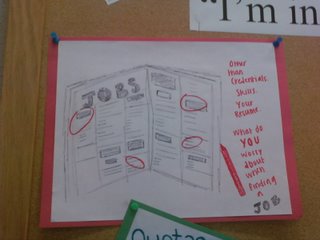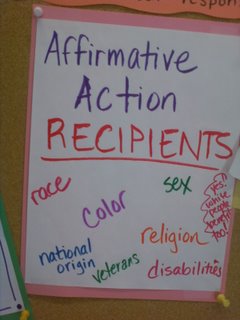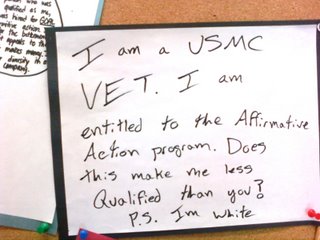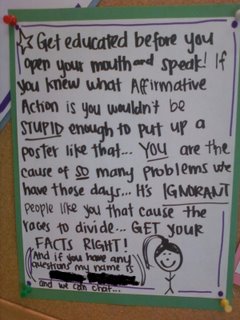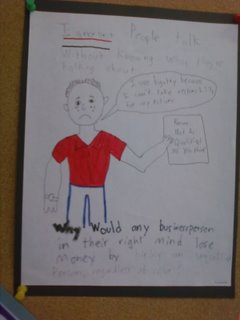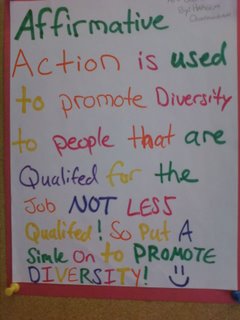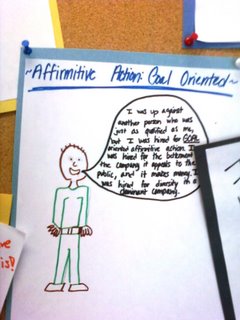Thursday, March 04, 2010
Bullard at SCSU
- He's unsurprisingly negative on the idea of a Federal Reserve audit. He estimates that his staff spends about 425,000 hours a year on auditing between internal controls, the Board of Governors, and the external audit from Deloitte. The GAO audit is in addition to that. His slide notes: "Additional audits are welcome, so long as they do not constitute political meddling." You know where I stand on this.
- I note a good point he made on political influence via appointments to the Fed. Governors have 14 year terms which are staggered; however, most governors do not stay for 14 years and replacements are only appointed to complete terms, not get their own 14 year term from the start. This has effectively shortened terms and increased political influence. I talked about this a little two years ago when Sen. Dodd held up appointments to the Federal Reserve, waiting for a Democrat to take the White House. Glad to see he picked that up.
- On regulation, he stated the common Federal Reserve line that the Fed had limited visibility of the financial crisis. Only 12% of of banks and 14% of financial assets were in institutions primarily regulated by the Fed in January 2007. The financial landscape has many institutions, and the Fed regulates only one of those. Yet it is lender-of-last resort to all. Many will scoff at this as a facile dodge of responsibility. But there are two points to be made: One, we can't use the term "the banks" to mean financial markets any more, since most financial firms aren't banks. Second, if the Fed actually could have controlled these institutions, why is the Congress debating how much additional authority to give the Fed?
- Every time I see this graph, I'm still surprised. I don't know why I am, but I am. While much of that will wind up, the part that represents agency MBS purchases, Bullard noted, will not. It's a big piece.
- I posed a question to him about whether the Federal Reserve's response to regulatory problems or to the financial crisis were influenced by the dual mandate the Fed has, vis-a-vis the sole mandate of the ECB or many other OECD central banks. He replied it did not -- they pretty much all behave the same way regardless of the mandate. He then ventured further to comment on whether the Fed should respond to asset bubbles. This has been a theme with him in the past, and he reiterated his view that the Fed has very limited tools to pre-empt bubbles.
Monday, February 01, 2010
You knew what I meant
While there are some, especially older students, who carry around excess anxiety and who sell themselves short academically, the more common affliction is overconfidence: �I expected to do a lot better.� The bump in the road that is the developmental class is seen as an aberration, largely lacking the sobering effect it would have had 30 years ago. No one is going to flunk out of school. Plenty of warning is given if you are in danger of failure. Most developmental courses can be taken on a pass/no pass basis. One�s GPA remains intact in any case, including a withdrawal. A system is in place to cushion failure, and students who have always been praised for just showing up need it. They have been told time and again, �You can be anything you want.� All that is needed is �passion.� So when the academic path contains a detour, explanations to yourself and to others can come easily. Scholastic problems don�t emanate from within but from without. So determined is the college to offer �support� and so long is the list of reasons to receive that support that almost anything can be explained by or blamed on an external cause�poor time management, attention deficit disorder, you name it.Not much to be done. We could get all tough love-y and just whack their self-esteem into place. But the drill instructor part hurts "retention", which means those classes that keep Prof. Miller's and my colleagues in subscriptions to Granta. So we throw money at the problem through academic services that give us students who ... are now more overconfident. And narcissistic. Why should they have to know grammar? You knew what they meant.
And we encourage that narcissism too.
As the college Web site says, the goal is �the development of persons as well as intellects.� Oblivious to signals of topic fatigue, some professors continue to assign readings highlighting racial or gender oppression, closed-minded fundamentalist Christians, wise elders �of color,� and any reading that focuses a spotlight on the warts of U.S. policy, history, or culture. Some professors operate on the mistaken assumption that students will be struck by �Aha!� moments as they are enlightened. So slight do we feel our influence to be that we take undue delight in satisfying our reformer�s instinct. Ah well, students must sigh, what else can be expected from college English professors?And it's not just community colleges. Here at SCSU the "freshman English" class is numbered English 191. Its course guidelines say that all sections will have as "focal points" "Strategies for critically engaging information and developing it in writing as evidence for arguments" and "Study of writing in relation to articulating human values, cultural perspectives, or interdisciplinary understanding." Things like "copy editing" (where I think you might try grammar or vocabulary) or "revision strategies" and "research strategies" are "secondary points."
Furthermore, students are asked to spend yet more time (as if they hadn�t spent enough in high school) dwelling on themselves, the ever-fascinating �I,� their own lives, their own �feelings,� their own variations on the endless quest for self-discovery. ...
Labels: higher education, SCSU
Thursday, January 21, 2010
Opportunistic drive-by smearing of political opponents
Somalis are upset, and rightly so. When the campus announced that its Somali student organization wanted to hold a speak-out, that seemed a very reasonable thing to do. The best way to deal with hateful acts is by speaking about them. But the news report this morning about this event contains two statements that I found deviated from speaking against the cartoon. And, unfortunately not a surprise, it comes from two faculty. First,
Luke Tripp, a professor of community studies, said the same "conservative white" mind-set led to the election of U.S. Rep. Michele Bachmann, R-Stillwater.This is an outrageous accusation. It says that anyone who voted for Rep. Bachmann has the same mind-set as the scribbler, is capable of being the scribbler, and is a reprobate. By what perverted analysis do you determine the moral principles of tens of thousands of area citizens that voted for this woman, many of them twice? What inspires a man to take a speak out against hateful speech of his students as an opportunity to engage in the worst stereotyping of political opponents?
I'm also moved to say something about the comments of a second faculty member who said "There are perpetrators on this campus who abuse students of color continually." This statement is either true or false. If the faculty member believes it to be true, he has an obligation as a member of this community to use the proper channels to have these allegations investigated and acted upon if they are judged to be factual. If not, or if he is not sure, his behavior should be consistent with the responsibilities that attach to his right of academic freedom. From the AAUP's 1940 Statement:
College and university teachers are citizens, members of a learned profession, and officers of an educational institution. When they speak or write as citizens, they should be free from institutional censorship or discipline, but their special position in the community imposes special obligations. As scholars and educational officers, they should remember that the public may judge their profession and their institution by their utterances. Hence they should at all times be accurate, should exercise appropriate restraint, should show respect for the opinions of others, and should make every effort to indicate that they are not speaking for the institution.Prof. Tadame's statement is not prefaced in this news story as being his own opinion, or an "I have heard that ..." or any such thing. He is an officer of this university as much as any faculty or staff member. To make such a statement without either bringing facts for investigation or expressing them clearly as his own opinion, not that of the university, is a shocking abdication of his responsibilities as an academic.
Sadly, we've been over this ground for many years. Indeed, these slanderous statements were part of why Scholars was created at one time (see our about page for the history.) And even more sadly, the best statement at the speak-out as reported comes from the only Somali quoted.
Mohamed Mohamed, president of the Somali Student Association, said he's encountered discrimination in St. Cloud. But Mohamed added that Wednesday's rally shouldn't be about pitting one race of people against another.Emphasis added, in case the professors missed it.
"This issue is not white and black," Mohamed said. "It's human rights."
Labels: higher education, SCSU
Tuesday, November 24, 2009
You're just trying too hard
�Celebrations of Peace� weaves a diverse musical program featuring SCSU's finest instrumental and choral ensembles into a variety of readings from the pangea of mankind.Italics added. Pangea? Most commonly that word means a supercontinent; I suppose this avoids upsetting any religion, but who knows? More likely the writer is thinking of Pangea Day. (More on that day.)
So in order to eliminate reference to religion we need a theory of plate tectonics? I think you're just trying too hard.
Labels: higher education, SCSU
Wednesday, November 11, 2009
Appreciation
St. Cloud State University Athletics will salute all members of the United State Armed Forces and veterans during Military Appreciation Night at the Husky men's and women's basketball games against Winona State on Friday, Dec. 4.I am happy to have Adam as a student and a major in our Economics program. He's a great young man, an excellent student, and on this Veteran's Day deserves our thanks for his service as do all the vets at SCSU.
As a special recognition on Dec. 4, all curent and retired members of the military and their families will be admitted free to the SCSU basketball games that night. The games begin with the SCSU-Winona State women's basketball game at 6 p.m., with the men's game beginning at 8 p.m.
One of those dedicated members of the military serving the United States is St. Cloud State University senior wrestler Adam Minette, a resident of New Prague and 2004 graduate of New Prague High School.
In addition to his spot on the SCSU wrestling roster, Minette serves with the Army National Guard. A redshirt senior at SCSU, Minette missed the 2007-08 season while serving on a tour of active combat duty in Iraq. He returned to the SCSU roster in 2008-09 and gained a 7-8 record with four pins at 149- and 157-pounds.
�It is a pleasure and an honor having Adam Minette as a member of our wrestling program," SCSU head coach Steve Costanzo said. "He has been dependable, loyal and committed in every aspect to our program. I am very grateful for what he has given to the citizens of the United States."
Monday, November 09, 2009
Part of the job
The purpose of a sabbatical leave is to enhance professional development, support department/unit goals, and/or meet the instructional, service, or research.I'm in my 26th year of service at SCSU, and so far have had one year (back when it was 2/3 pay for a year-long sabbatical rather than 80%.) My work that year and two more years, during which the university did not pay me but expected me to return to repay my sabbatical -- more on this below -- lead eventually to a third year away to work as an adviser at the National Bank of Ukraine and to my first book. I'd vehemently disagree with the idea that I 'took time off'. Indeed, the KSTP report cannot deny that these faculty members on sabbatical were in fact improving themselves. Sabbatical is not vacation. In 2007-08, throughout our system, here's what the sabbaticals were used for:Subd. 1. The President/designee may grant a sabbatical leave to an eligible faculty member who proposes to undertake a scholarly research project, additional study, or other endeavor related to the purpose described above.
- Professional development 26%
- Curriculum development 32%
- Education 18%
- Research 22%
...sabbatical leaves are an investment of the college/university in its academic future and reputation. Sabbatical leaves granted under the provisions of the collective bargaining agreements have permitted faculty to revitalize their teaching, improve their research skills, and maintain a vibrant, engaged, and up-to-date outlook on their profession.
One will recognize that sabbatical contains and derives from the word Sabbath, which holds two separate implications. One, it is intended to happen every seven years. As the report indicates, sometimes you cannot take sabbatical during the seventh year, or eighth, because your department would lose too many faculty and could not offer the courses needed to your students. So you wait. We are only guaranteed that we can go every ten years. Between seven and ten, your application gets scored, and you must have a minimum of 60% of the points scored or else you're out. Everyone knows the scoring rubric, and the applications typically are accepted. At the end of your sabbatical you complete a report on what you did.
But the other part of the sabbath that gets used in sabbatical is that it is a time of rest. Just as the Bible asks for land to recharge itself every seventh year (thanks to Jill Schneiderman for that observation) so too do faculty need to let the mind go wander once in a while. My own field changes from time to time. My next sabbatical -- I am one of those people who is asking to go away next year, seventeen years since my previous one -- will be my transition year to a post-chair life, one in which I start trying to teach economics more to people off this campus. But I need to figure out how to be effective in that teaching. I would like the inspiration to come during those thinking times in my day, but to actually build the course takes much longer. Should we have time to do that outside of the classroom?
So here's the real point, if you want to get to the dollars. If you tell me I have to do this job and never take a sabbatical, I would like to be compensated for giving up that right. Suppose my union and the state negotiate a 10% wage increase in return for the lost right. If I'm only guaranteed sabbatical every ten years, I only get one reassigned semester a decade. The state pays someone to replace me for that semester, and probably will not pay 50% of my salary, since that person is likely to be a lower-paid instructor (a young person just out of graduate school.) Are you better off or worse off, taxpayer-dollar-wise? And in the long-run, am I a better or worse instructor for having that time of rest, reflection and retraining?
Labels: higher education, SCSU
Tuesday, October 13, 2009
A request
No discussion of the new Days of Rage appears on the schedule. Hmmm.
Labels: higher education, SCSU
Tuesday, September 15, 2009
Faculty union forgets forgotten man
Many of us (including me) are City residents. All of us have a stake in building a just and welcoming community for ourselves, our students and our neighbors.Now the last time I looked, over 20% of our faculty drive from a seven-county metro area to us. The basic reason given for support is to join other groups on campus, and because "all of us spend significant time here and we and our students are deeply affected by the human rights climate of the city."
At its September 8, 2009 meeting, the Faculty Senate passed the attached resolution regarding the preservation of a Human Rights Office in the City of St. Cloud. On behalf of our members I ask you to find a way to restore staffing to the Human Rights Office.
We have a state human rights department. One can argue that we need more local enforcement, but let's look at the city's department. Its last meeting minutes from March 2007 (yes, 2007) included a concern over how many minority children are in youth soccer (a private organization) and whether to try to put "local dolls" into schoolchildren's hands.
The Human Rights Office was budgeted $98,100 for FY 2007. Question to my union: Where would you find this money? What expenditures would you cut to free up that amount? If you say you would tax it, who would you choose to make to pay for YOUR choice? Is part of being a good neighbor asking your neighbor to pay for your preferences?
(Title explanation)
Labels: higher education, SCSU
Thursday, September 10, 2009
Dummies caught the hiney
Yesterday's deans and dummies brought forth the local campus health service to discuss the H1N1 virus. Given it hits 5-24 year olds more than the rest of the population, we are a flashpoint for the "hiney flu" (we have lots of pork producers 'round here, so the other popular name for this flu is banned from this blog.) The school has turned its emergency page into a flu info location, asking students to develop a "personal flu plan."
It's actually a serious matter, since 2,500 of Washington State's 18,000 students are suspected to have H1N1. "Suspected" since it's been decided by most health care officials that if you aren't hospitalized you don't get tested for which flu you have. (Also, no sick slips for students to be excused from classes -- we are being told to "let 'em go" even if we think someone is using the flu as a dodge to get out of mandatory attendance.) And the advice is to have them "self-isolate". Most students are more than happy to isolate themselves from a classroom, but from each other is another matter.
I talked about this in class today, about the norms for behavior. Would you call people you were in contact with 24 hours earlier to let them know you have hiney flu? Do students more try to come to school when sick or dodge classes for any old reason? There are norms of behavior, and they differ from school to school.
So imagine my surprise when I discover in the middle of this article:
California's Pomona College has a new mandatory course for freshmen: the proper way to sneeze and cough (the answer: into one's sleeve).Let me remind you that Pomona is a rather elite institution. At which we need to teach students to sneeze? What other element of higher education does this course replace?
"I share a bathroom with seven other guys," said Alex Efron, a Pomona student. "That's a bit of a concern for me."
If they're like us, they're a university where you have to have hot air blowers in lieu of paper towels in the bathrooms to "save the planet" (and where they put the trash bin just below the blower)? Where part of my deans-and-dummies treat yesterday was a discussion of whether we could use state funds to purchase hand sanitizers? (I kid you not: that was 3.5 minutes.)
Thanks to Charles Johnson and Matt Reynolds for parts of this story.
Labels: health care, higher education, SCSU
Three "country economists"
One thing that you may notice: none of us went to college to be economists. I bounced through two pre-professional programs plus philosophy before landing on economics (I took the GMAT, LSAT and GRE in a six-week stretch.) The other thing I notice is we all went to liberal arts schools and had the traditional education of taking courses in areas you didn't know you were interested in. I wandered into economics as someone interested in pre-law (it's great for that) and got talked out of law by "Professor Kingsfield".
Labels: economics, SCSU, St. Cloud
Tuesday, September 08, 2009
Daily effects of indoctrination, Part V
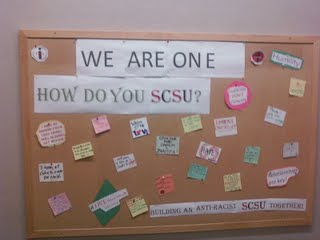 We have done a long series on bulletin boards on this campus, most famously one in which we had a student react poorly to a display and thus we got a response. This bulletin board which is our most frequent source of blog material is from a stairwell in my office building which is traveled by many students and faculty during the day.
We have done a long series on bulletin boards on this campus, most famously one in which we had a student react poorly to a display and thus we got a response. This bulletin board which is our most frequent source of blog material is from a stairwell in my office building which is traveled by many students and faculty during the day. 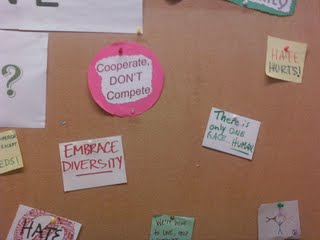 This one in the upper left -- "Cooperate, DON'T Compete" -- caught my eye, and I discussed it in class. One of the lessons economics teaches is that cooperation is the result of competition. When sellers compete with other sellers (not buyers) the result is that people who want the good get it at a lower price, delivered to their door, fresh. "It is not from the benevolence of the butcher, the brewer, or the baker, that we expect our dinner, but from their regard to their own interest," Adam Smith wrote. It is utterly remarkable how economically illiterate that comment was.
This one in the upper left -- "Cooperate, DON'T Compete" -- caught my eye, and I discussed it in class. One of the lessons economics teaches is that cooperation is the result of competition. When sellers compete with other sellers (not buyers) the result is that people who want the good get it at a lower price, delivered to their door, fresh. "It is not from the benevolence of the butcher, the brewer, or the baker, that we expect our dinner, but from their regard to their own interest," Adam Smith wrote. It is utterly remarkable how economically illiterate that comment was. 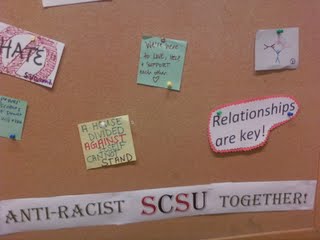 I need to figure out how to do a Wordle of this board. The two most common words (says he with only casual empiricism in this, so feel free to verify) are love and hate. Hate is something we need to stop, love is something we need to start. At which point I ask: To what extent is this love and hate something that an institution of higher education is able to provide? I have no evidence that this is something we do well. We can create a love of learning, or a hate of falseness, perhaps ... but these are not the types of things we do well, and certainly not recently. The curriculum provided here fits not even that envisioned by Peter Wood as "have it your way": No, we say you will have it our way, a way we call "anti-racist" without an examination of whether or not racism exists. After all, an "appreciation" of "institutional racism" is considered by US to be our highest priority.
I need to figure out how to do a Wordle of this board. The two most common words (says he with only casual empiricism in this, so feel free to verify) are love and hate. Hate is something we need to stop, love is something we need to start. At which point I ask: To what extent is this love and hate something that an institution of higher education is able to provide? I have no evidence that this is something we do well. We can create a love of learning, or a hate of falseness, perhaps ... but these are not the types of things we do well, and certainly not recently. The curriculum provided here fits not even that envisioned by Peter Wood as "have it your way": No, we say you will have it our way, a way we call "anti-racist" without an examination of whether or not racism exists. After all, an "appreciation" of "institutional racism" is considered by US to be our highest priority. 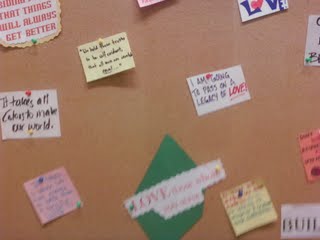 So we will pass on a "legacy of love" and not a legacy of knowledge. That's what's more important here. It takes "all Colors" to make our world, without understanding the utter poverty of that world 400 years ago. Was this in a dorm, on a student's door, I'd smile and think this is a very nice student. As the goal of education, in a classroom building, I worry about what kinds of students we are creating.
So we will pass on a "legacy of love" and not a legacy of knowledge. That's what's more important here. It takes "all Colors" to make our world, without understanding the utter poverty of that world 400 years ago. Was this in a dorm, on a student's door, I'd smile and think this is a very nice student. As the goal of education, in a classroom building, I worry about what kinds of students we are creating.Labels: economics, higher education, SCSU
Thursday, August 20, 2009
Sustaining trade and education
This morning I�d like to focus on the concept of sustainability in its broadest interpretation � developing and applying best practices to support and nourish all aspects of our university. In business they refer to this perspective as the �triple bottom line��.attending to ecological, social and financial outcomes in managing a business. This perspective is especially important to an institution that must be what it teaches and which cannot accomplish its mission without being a strong, inclusive and anti-racist community. We will accomplish these objectives by making sustainability, most broadly defined, a cornerstone of our identity.Well that rung a bell in my head, and as I went to remember where I read this it came to me. Peter Wood and Ashley Thorne at the National Association of Scholars has been writing about that very thing all summer. Ashley finds this statement from the American College and University Presidents Climate Commitment:
...we recognize our responsibility to minimize our own contributions to global warming and to accelerate education and research to make the transition to a low-carbon, more vibrant and sustainable economy. We believe that taking a leadership role in this effort fits squarely into the educational, research and public service missions of higher education.Ashley asks if this is true. Peter answers what is to me an interesting question: why now for universities? It's not like the green movement was invented by Al Gore. Peter suggests first that outside groups have pushed for it, and that their success among university presidents and particularly residential life staffs has to do a misunderstanding of the word they use.
�Sustainability� is not the foundation of all learning and practice in higher education. Higher education is a complex enterprise that combines the pursuit of truth through rigorous inquiry with the transmission of culture and civilization from generation to generation; the practical preparation of students for work in fields that require advanced intellectual preparation; and the pursuit of personal excellence, usually in the context of moving to full adulthood.What stuck with me from our convocation address was the turning inward of the university: We now have a community garden that says "grow your food here" while we talk about giving our students international experiences. But sending students abroad is about exchange too. And I teach that exchange of values -- embodied in goods, services, or ideas -- is a good thing. Let me imagine using in my principles of economics course this passage discussing trade, from a 2006 editorial by Walter Williams (this is just an exemplar):
Some aspects of this involve �sustaining� what already exists. The university builds on intellectual and cultural traditions which must, in some sense, be sustained. But Second Nature, ACUPCC, and others who evoke �sustainability� in this context are engaged in mere word play. We sustain the pursuit of truth by pursuing it; we sustain cultural traditions by participating in them; we sustain complex utilitarian learning by mastering and exploiting it, and if possible extending it. We sustain the pursuit of personal excellence by distinguishing worthy from unworthy goals and pitching ourselves tirelessly toward the former.
There is nothing in these forms of �sustaining� that has any real connection with �sustainability� in the environmental sense, or in the senses of the other appendages of the sustainability movement: sustainability economics and sustainability social justice. The environmental sense of sustainability emphasizes curtailing the use of resources; simplifying; going without; substituting less energy-demanding alternatives; trying to leave the conditions of nature as little perturbed as possible. This ethic of self-erasure is antithetical to much of what is truly foundational to the university, which elevates man�s pursuit of knowledge, not his determination to render himself carbon-neutral.
Sustainability at bottom is a doctrine of doing less. Higher education is at bottom an institution that strives to do more.
What the sustainability movement aims to sustain above all is the earth. What higher education aims to sustain above all is civilization.
Why do we choose to import cocoa, coffee and spices rather than produce them ourselves? The answer is that it is cheaper to do so. That means we enjoy a higher standard of living than if we tried to produce them ourselves. If we can enjoy, say, coffee, at a cheaper price than producing it ourselves, we have more money left over to buy other goods. That principle not only applies to cocoa, coffee and spices. It's a general principle: If a good can be purchased more cheaply abroad, we enjoy a higher standard of living by trading than we would by producing it ourselves.So do I now believe that, if the president of my university says we will make "sustainability, most broadly defined, a cornerstone of our identity," that I am not at that cornerstone when I teach comparative advantage, the advance of society through specialization and exchange? I will anticipate the answer to be that I have not defined sustainability broadly enough. What I would respond is how fragile the domain of trade has been historically, or even experimentally.
For further reading, Peter Wood offers a look at the organization and goals of the group behind this fusion of sustainability and higher ed. So far the alarmism of the sustainatopians has not reared its head here. All we have is some land devoted to a garden (and a faculty member given time off from classes to tend it) and some vegetables hawked in the student union. But we'll not be surprised when the pressure turns up for social action over intellectual inquiry.
Labels: economics, global warming????, SCSU, sustainability
Monday, July 27, 2009
I don't negotiate with the uninformed
Yet, the real racket is math. Yes, I failed the placement exam and am in Math 70 this summer. I realize that math is important, but looking in my book at the chapters ahead I realized that Math 70 is sufficient for college students and anything beyond this is just nonsense and a waste of money for students not majoring in the sciences, economics or engineering.Now if you've read this blog for any length of time you know my opinion on this: To be considered a college-educated student, college algebra is as basic to your education as English, philosophy or physical education. (And we could have a discussion about PE, if you like, but I'd defend it.) Math 70 is our remedial class called Basic Mathematical Skills. The placement exam this student failed was the one that makes it possible for you to take a finite math course that is our university's math requirement. That's right, we don't require the algebra here at SCSU. (It is now required of our majors, after many years of debate, even though a plurality of undergrad economics programs require some level of calculus.)
I've discussed Math 70 before. A student who takes it has already had a low score on his ACT, and either failed or didn't take the placement test. But somehow this student thinks that by "looking in my book at the chapters ahead" he knows what is sufficient for someone to know who's not going into a math-intensive field.
He'd probably do well as a government-single-payer health insurance administrator.
Why on earth would I need to know how to do the following in the world of journalism: 9+-3{(2)x=-14-13x}; what is x? Will I ask this to a police officer or a musician or a politician or an athlete? Will such an equation come up when trying to crunch numbers in investigating racketeering stories? Perhaps, but most people would probably use a good old calculator.First off, I'm pretty sure you wrote that equation wrong given the unbalanced parentheses or {}. Second, it's basic to not only getting in to a good college but to surviving an ever-changing world and job market. You simply don't know enough to hold any job in which you have to manipulate symbols or values by a set of logical rules. You would really want me to believe you can be a writer without control of logic?
Of all the classes I have taken at SCSU, none required of me more than the basic use of addition, subtraction, multiplication and division.I suspect you're right, and for that I apologize on behalf of the faculty. We have done you an ill service by not expecting more of you.
Now, for the teachers and students who think Math 193 is important for all students, I ask why? Students who appreciate it are probably going to actually utilize such a craft in their job fields and the teachers will say it is important because all students (by that, every student at SCSU) will need these skills (they won�t). Friends of mine who have graduated and have gotten high paying jobs have attested to me that what they learned in Math 193 has never been a part of their jobs.I doubt you know who to thank for many of your abilities. I know how to tie a bow knot. I don't remember who taught me, maybe it was Boy Scouts, maybe Dad. All I know is I can do it. I know how to think logically. I cannot possibly tell you where I learned that lesson. It's the stock of learning from the flow of many classes, many problems, many teachers. And the one thing about which I have no doubt is that practice sharpens your skills. I haven't done a
Labels: economics, higher education, SCSU
Wednesday, July 15, 2009
It must be the water
Labels: higher education, SCSU
Friday, July 03, 2009
Does priceless mean infinite price?
Thanks to our local communications staff who put that together; I wasn't as enthused about the cover as others, but it seems to have gone over well. I am deeply grateful to this university that has given me plenty of opportunities to be successful and in my corner when I am. When I do write critically of the school on this blog, I hope readers understand it's the disappointment one feels when a loved one doesn't meet the ideal vision one has of it. It has long been populated with wonderful people, most of whom are friendly even when in deep disagreement. One can hardly ask for more.
Tuesday, June 02, 2009
Outsource my day
- Mike Munger is experiencing what our tax regime might look like in a few years;
- Russ Roberts sees the Obamas' date night as a Keynesian might.
Friday, May 15, 2009
Hurry up the white flag
Today, Thursday, May 14, the North Dakota State Board of Higher Education passed the following unanimous motion:
"Consistent with the terms and conditions of the October 26, 2007 Settlement Agreement entered into with the NCAA, the Board directs UND officials to retire the 'Sioux' nickname and logo, effective October 1, 2009. Full retirement of the nickname and logo shall be completed no later than August 1, 2010. In the event a new nickname and logo is adopted by UND, they shall not violate the NCAA policy regarding Native American nicknames, mascots and imagery.
UND is further directed to undertake actions consistent with the Settlement Agreement to protect its intellectual property rights in the 'Fighting Sioux' nickname and mark. UND is further directed to address the imagery at Ralph Engelstad Arena and other venues pursuant to the terms, conditions and timelines set forth in the Settlement Agreement. ...
UND President Robert Kelley seems resigned to the fate of the nickname. On Say Anything, the timing of this event is questioned, since one band of Sioux had already agreed to the nickname. The other one has a tribal council blocking a referendum on the issue. "The Whistler" at Say Anything wonders:
According to the timeline set up by the Board of Higher Education the committee was supposed to work on this issue for the rest of the year. When the Attorney General negotiated the terrible settlement with the NCAA he said that he and the governor would meet with the tribes to settle this matter. Of course they never did. Specifically John Hoeven isn�t going to address a controversial subject if he can possibly duck it.On the SCSU campus a promotional weekly of "SCSU in the News" announced this as a victory ... for SCSU:
This committee headed by Grant Shaft was formed last year and met one time. According to their schedule they were to meet four times.
They only met once. Grant Shaft says that the Summit league membership was on the line. The Summit league said that wasn�t the case. So why did they have to decide now.
The settlement with the NCAA was set up so that the Fighting Sioux name would just go away without the local self-appointed elites being blamed.
But then something happened. A local group on the Spirit Lake Tribe decided they didn�t agree with the elites. They like the name. They brought it to a vote on the reservation and it passed overwhelmingly.
That left getting a vote of the members of the other Sioux Tribe in the state.
That�s why there was a hurry. The Board of Higher Education was afraid that members of the Standing Rock Tribe would force a vote and approve of the nickname. And then where would those self-appointed elites be?
For 16 years a number of St. Cloud State students, faculty, staff and administrators pushed the University of North Dakota to cease using its �Sioux� nickname and logo, arguing they are racially hostile and abusive. The end game in that long battle may be near. On May 14, the North Dakota State Board of Higher Education ordered UND to retire the 'Sioux' nickname and logo, effective Oct. 1, 2009. ...Let's summarize, then: A group of elitists at the NCAA, at one time headed by President Saigo, lobbies to force a competing athletic program to abandon a long-used mascot. The mascot uses the name of a Native American tribe, one band of which approves of the mascot, the other of which is blocked from voting in a referendum on the mascot. The elitists then take the blocked vote as a sign that they have done the right thing and compel a university to end its long tradition. President of that university is left to make apologies and ask for kindness from those whose wishes were trumped by the elites. (I have no idea of Pres. Kelley agrees with the Board's decision; at any rate he's made the best of a raw deal.)
St. Cloud State involvement in the controversy includes a campus ban on using the logo and nickname in university-produced publications, an NCAA resolution, protests at athletic contests involving UND teams and classroom curricula. Among our leaders on this issue were former presidents Robert O. Bess and Roy Saigo, Athletics Director Morris Kurtz and Sudie Hofmann, professor of human relations and multicultural education.
Labels: mascots, North Dakota, SCSU
Thursday, April 02, 2009
Proportionality
A class studying civil rights activist Dorothy Irene Height�s life and legacy stood up to the person who perpetrated the most recent act of cowardly graffiti on the St. Cloud State University campus.This is the very same bulletin board we discussed last year; I know the professor and the class, and saw the board before the graffiti and the response. The display had once again the amateur drawings, but in this case laying out the life of a woman whose story wasn't very well known, and perhaps did need to be more known. Unlike last year's, this display had the quality of telling a biography in an informative way. (I'll suggest someone from that class should spiff up her Wiki page; they seem to have learned enough to improve on this.)
Several students in a class called Race in America, without prompting from university administrators, banded together to immediately and publicly denounce a racist message posted on a bulletin board honoring Height�s accomplishments. They left the racist vandal some graffiti of their own.�Not true. Not funny. Not OK in my community,� read one.
�Racism is ignorance,� read another.
�Man up,� another read. �Do you talk to your mother with that mouth?�
The student-driven outcry spread through text messages, e-mails, Twitter and Facebook early this week and continued Wednesday. By Wednesday evening, students had left more than 100 notes for the unknown racist.
There's no doubt that the person who chose to scrawl graffiti on that display deserves condemnation. One hopes that the student would receive instruction on why that's not the way to engage those with whom you disagree.
But really, "the unknown racist"? Isn't this a bit extreme? I saw a couple of groups, lead by faculty, walking past the display. (UPDATE: Stepped out for a few minutes and found the professor with some of her class, filming statements around the display: They've announced they will be put up on Facebook and Twitter.) The notes pasted up are by and large of the "that ain't cool, man" variety, but a few would suggest something more angry. One of the short stories I read in an English class (I think in high school) was The Lottery. Does anyone assign this any more? Do students have an appreciation of how groupthink can lead sometimes to mob violence? The question is, does one graffito make a racist, known or unknown?
It intrigued me that in this story -- unlike any stories ever written about crime, for instance -- the race of each student quoted in the story is identified. Sure, I understand the reason being to show solidarity, unity in opposing racism. But have we now reached a point where journalistic standards will include a style sheet saying when it's OK to recognize race and when it's not OK?
A few days ago James Taranto commented on a similar story, an AP report that despite the existence of President Obama not all jokes about race have stopped whizzing over the internet. He traces out the history of the United States and notes:
Like all colleges, our university has many young people, learning about what it means to be an educated person, engaging in self-expression. We have classes that teach about race mandated for every student, but reacting with this mass expression to any dissent to it. Our university's goal may be to reduce racism in one place, but a policy of zero expresssions of racial slurs is a chimera. We are human beings, fallen from Eden. Most of us resist sin some of the time; none of us resist all sin all the time. How should a university treat one of its students -- if indeed that's who it is -- who falls, who fails?How far does America still have to go to bridge its centuries-old racial divide? Liz Sidoti answers the question:
Even in 2009, a black man cannot become president of the United States without some knuckleheads sending stupid emails about him.
To be sure, America has made some racial progress. But the dream of equality will not be truly and fully realized until President Obama's political detractors treat him with the same respect George W. Bush's detractors showed him.
SCSU may think it is overcoming racism with its hallway displays. But if we're ever going to really overcome racism, it will be when we stop looking for the guy who drew the graffito with stones in our hands or fury in our pens and markers, and can instead embrace him or her with the same love and discipline (law and gospel, if you will) that we show any other wayward child, and it stops being a news story.
Labels: higher education, SCSU
Monday, March 02, 2009
Talks from the Winter Institute
If you have itnerest in China, you can find the Friday presentations by our delegates from Nankai University Binhai College, Nicholas Lardy and Wing Thye Woo as well as the lunch talk by my friend Jack Hou from this page.
Friday, February 27, 2009
From the Winter Institute
I'm sitting at this moment watching the second of two presentations on China-America relations. �The Economic Outlook last night was great fun; while none of our out-of-town speakers were there, we had over 250 in the audience. �While many of my former students were stuck in the Twin Cities, some closer alums made it; we also have a large number of economics students from UM-Duluth here for the conference.� My presentation from last night is here, as promised to you yesterday.
The view from this conference is that China is needed to help the US and world economy come out of recession (I've mentioned this fellow's comment from a couple weeks ago) but Wing Thye Woo (whose speech is going on while I type this) is concerned that a trade war is about to break out that will cause disruption of both goods and credit flows. �The EU is already threatening China. �
Reading tonight: �10 Reasons Why China Matters to You
Thursday, February 26, 2009
Putting the Winter in Winter Institute
If there's a podcast, I'll let you know. My slides will be posted on this page later tonight, though as we've been adjusting the program during the day my slides have changed dramatically and I'm not sure what version I converted to pdf any more. Oy!
Tuesday, February 24, 2009
Posting slow today, but for good reason!
On Friday, the Winter Institute is on Sino-American relations, with the highlight (at least for me) Wing Thye Woo from UC-Davis. I met Woo in Claremont many years ago when he was writing with Jeff Sachs on Chinese economic development, and his work is quite impressive. Also, my friend Jack Hou is giving the luncheon talk. (I'm going to lecture him on not having a professional webpage.)
More tonight if I get a break from making slides for Thursday!
Thursday, February 19, 2009
Apartheid discussions
"I asked those leading the panel to please help me understand what these pictures had to do with this event," Edelheit said. "If there was a direct answer to my question I would have left - it would have taken less than three minutes."And there, in a nutshell, is the problem of university campuses. What is desired, a sharing of views, is not really the interest of the Left on campus. The last thing they want is intellectual diversity. They want separatism. Their students should be shielded from conservative thought, from anything that might interfere with the campus Left's fawning over Hamas. I'd like to thank Professor Edelheit for pointing out the real apartheid on our campuses, rather than this faux one the Left is inventing. (And it's not new, as this article from 1990 shows.)
...Questions were raised as to why Edelheit has not organized or spoken on the same panel with Slisli and Tademe last Wednesday. Edelheit responded by saying he was refused and opportunity to be on the panel, but it has not been the first time Slisli and Tademe have denied him.
"I made a decision last Wednesday because these two professors have, for five years, ignored me and repudiated my presence on this campus," Edelheit said.
Having two separate presentations about the same topic negates the potential usefulness of a public forum, according to Edelheit.
"Separate discussions are fruitless," Edelheit said.
Labels: higher education, SCSU
Tuesday, February 17, 2009
The feel-good profit
SAVE EARTH! Glorioski, how'd they do it?! Here's the story:
The Garvey Commons experimented with trayless food service earlier this year and then asked students about making the change permanent. Garvey will be largely trayless for the rest of the year and all of next year, and another evaluation will be done to see if the change will continue.I envision a whole new diet plan, to be heard soon on Oprah: Throw away the dinner plates. Have your family eat off small plates and they'll eat less.
Going trayless saves 650-740 pounds of food waste a day, 400-500 gallons of water a day and allows Garvey to use about 10 percent less soap, rinsing solution and other chemicals. It also forces students to make better choices of how much food they eat; they won�t add food to a tray just because they have the room.
Let me explain: Sodexho, our food service operator, is going to "save 650-740 pounds of food waste a day". Cui bono? Why, Sodexho! It serves less food and saves on detergent. Is any of the savings to be shared with students? No, because they are SAVING EARTH!
According to the survey (done after the trial), 66 percent of students said the benefits to the environment outweighed any inconvenience of going without trays. And 69 percent said the benefits of possibly saving money on their meal plan outweighed any inconvenience of going without trays.Don't hold your breath on getting that cash, Sarah Student. And the newspaper blithely joins in, on page one, with that headline, helping to perpetrate the fraud. Students accept inconvenience in return for feeling good, and nobody is going to correct their errors.
UPDATE: It's a fad in many places.
Monday, February 09, 2009
What does one say? What does one do?
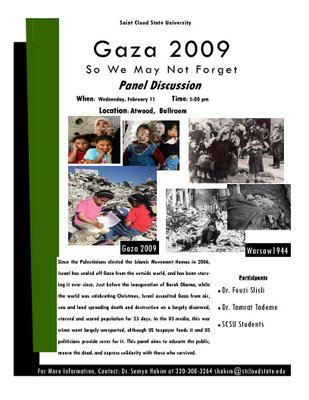 Click to enlarge. This was distributed this morning as an announcement to our campus. Your suggestions for how to respond are invited in comments. I support campus free speech. I also think the comparison drawn is outrageous and disgusting. Beyond saying so, what does one say or do?
Click to enlarge. This was distributed this morning as an announcement to our campus. Your suggestions for how to respond are invited in comments. I support campus free speech. I also think the comparison drawn is outrageous and disgusting. Beyond saying so, what does one say or do?Labels: fill-in-the-blank studies, free speech, higher education, SCSU, totalitarianism
Friday, February 06, 2009
Mrs. Scholar writes
Wednesday, February 04, 2009
I learn a new phrase
Refugee Run is basically that, except replace white students with Davos attendees.
But that wasn't the most important thing I got. Easterly writes:
Alex de Waal in his equally great book Famine Crimes (and continuing writings since) writes about �disaster pornography.� He gives an example of a Western television producer in Somalia in 1992-93 who said to a local Somali doctor: �pick the children who are most severely malnourished� and bring them to be photographed."Disaster pornography", as Sam Kinison famously lampooned, continues to this day. At the Super Bowl party I attended Sunday someone wondered where Sally Struthers is. (It was a guy, so I let his ignorance of Gilmore Girls pass unremarked. Until now.) We all take advantage of it -- there are conservative talk show hosts that use the image of starving Haitians to raise money to send money as well as the more liberal Sachs-Stiglitz types who think the U.S. aid budget is too stingy.
Disaster pornography is what killed the Bush presidency in New Orleans. What will be the DP image that weighs down the Obama popularity rating? You may think the MSM would never do such a thing, but what bleeds, leads, and the Obama presidency will be dull soon.
In the time since his inauguration, Mr. Obama has been on every screen in the country, TV and computer, every day. He is never not on the screen. I know what his people are thinking: Put his image on the age. Imprint the era with his face. But it's already reaching saturation point. When the office is omnipresent, it is demystified. Constant exposure deflates the presidency, subtly robbing it of power and making it more common.Before long, some cameraman will be looking for the doctor in some faraway place to hold up the sickliest child to the lens.
Labels: economics, leftism, Obama, SCSU
Tuesday, January 27, 2009
Where I was yesterday
Mrs. S says that's a good picture, but do I REALLY move my arms as much as that? That's why I do radio.
Labels: economics, SCSU, St. Cloud
Monday, January 19, 2009
Not all wine and roses tomorrow
The mainstream media has extended its honeymoon with the new administration; even as scandals, bailouts, proposed federal works programs, a falling economy, and questionable cabinet appointments take place.Our local campus has a YAL chapter; I agreed to serve as its adviser when they said they needed one in order to form. Here's their press release:
Many Americans say, "Give him a chance. He can fix our problems." But, why be fooled again?
Government is limited by the United States Constitution for a reason. Society is a responsibility of the people, not the government.
We already know the real Barack Obama. We know his cabinet appointments; we know his voting record; and we know his beliefs.
He promises more foreign intervention, more socialism, more restrictions on our civil liberties, and a greater disregard for the Constitution.
Rather than wait for another politician to disappoint the American people, let's stand up as patriots and say one day of Barack Obama is enough.
Tomorrow, Barack Obama�s Inauguration Day, students will participate in an activism event on college campuses nationwide declaring, �Change? What change?�That "R3volution" is of course a Ron Paul trademark. Please do not infer from my advising of the group that I am in agreement with the positions of Rep. Paul. I believe, however, that students who disagree with liberal orthodoxy on this campus need to organize, and am happy to let a hundred libertarian groups bloom.
Thus far, 41 chapters of the group Young Americans for Liberty (YAL) have confirmed their participation. Each chapter will distribute flyers, hand out pocket constitutions, and talk to students about the dangers of Barack Obama�s policies on their campus.
The local YAL chapter at the University of St. Cloud will host their own event on campus at Atwood Memorial from 10:00am � 3:00 pm. Media is welcome to attend.
�This is no doubt a historic day, but Barack Obama does not offer real change. His policies only enforce bigger government, an increase to the already massive budget, the same foreign policy, and the continued destruction of our civil liberties,� says Sam Swedberg, President of the YAL chapter at the University of St. Cloud State .
YAL�s event, Real Change Requires R3volution, seeks to peel back the marketing of Barack Obama and expose his policies for what they really are � not real change. Before taking office, Barack Obama has put forth an $800 billion economic plan, promised more troops in Afghanistan, and begun talks of reviving the draft.
�Not all young people are excited about the policies of President Obama. Who do you think will pay for all of this reckless spending? Who will fight and die in these unnecessary wars oversees? Our generation will,� says Jeff Frazee, Executive Director of YAL, in Arlington, VA.
For more information about the event, please visit http://www.yaliberty.org/change and join us on campus at Atwood Memorial tomorrow, Tuesday, from 10:00am � 3:00pm.
I would point out to them (and will when I see them next) that no policies have yet been enacted; his fellow Democrats are already shredding big parts of Obama's stimulus plan, including the $3000 tax credit for new jobs. But a compromise between Obama and the Democrats is unlikely to produce less state control of the economy.
One more comment on the upcoming inauguration
Undoubtedly some of the fascination with Obama is race. How could anyone think not? So when we have groups on campus dedicated to advocacy for particular races (called "underrepresented" or "historically underserved" or some such), celebrations of an advance of those races is to be expected. Tuesday is a great day for many reasons -- it reminds us of the robustness of our democracy, for one thing, and for another it marks an important expansion of political participation that we could not have imagined fifty years ago. So I do not have any problem that student organizations organized on race -- of which we have all but one, as there's no white student organization; just as Indoctrinate U pointed out, we have no male analog to a Women's Center -- celebrate the accomplishments of that race.
Is this hagiography evidence of left bias in the university? I don't know. When you have Obama visiting the Post and they snap cellphone pictures like ten-year-old girls at a Jonas Brothers concert, it's hard to blame a university for setting up a few big-screen TVs to watch an inauguration. It just reflects the mood of the times.
Nor would I complain greatly of having students taken from a classroom to watch the Inauguration, provided that the course is one for which presidential inaugurations or race relations was germane to the topic. I would ask, if a chemistry professor took her class to this event, what the Inauguration has to do with chemistry. I teach economics of developing countries tomorrow, 12:30-1:45. I will not take my class to it; we will have our normal lecture. That's my contract with them and what the state pays me to do. If students want to cut class and watch the Inauguration it is their right to do so. As with any other class, I do not incentivize absenteeism by sending out notes ex post or answer emails of "what did we do in class today?" Nor will I tomorrow. But that's my decision, based on what I see my contractual and ethical duties to be to my employer and to my students.
So while some, including some campus readers of this blog, have questioned the events, I see no reason to complain about it. But two last observations that are less positive about the events on campus. First, I think it's fair for one to wonder how many classes will take advantage of this. It may be many. Faculty these days tend to think more about the object of study than the disciplines with which they study. They can justify taking the students to view the Inauguration by saying something like "I study current events". All of the fill-in-the-blank studies programs will have no problem providing some rationale. It is this lack of disciplinarity that, in my view, is cheapening college education. Lacking a discipline means lacking its ethical standards. That is stuff out of the toothpaste tube, alas, not likely to ever be put back in.
Second, in the course of defending the campus viewing opportunities, one professor wrote this:
I would hope the majority of those who did not vote for Barack Obama did not "not vote" for him because he is an African American. And of course, now he is President elect for all Americans, not just those of us who voted for him.How unfortunate a paragraph. 56 million people voted for someone other than Obama, and each one of them now has to be judged by the anointed like this professor. Did a few vote for McCain because Obama was black? I suspect so. But did a majority of those who did not vote for John McCain not vote for him because McCain is white? Did a majority of those who work in multicultural student services "not vote" for McCain because of race? These questions are absurd, of course. So is the question implied in the quote.
If Obama is going to be a post-racial president, he needs to work on professors who cast aspersions on those who might have voted for McCain because they don't like trillion dollar stimulus bills, or who think a 72-year-old guy has more experience than a guy who writes a biography before he has one, or who thinks the guy with military experience might be better for national security than the guy without. Nobody should have to prove those reasons were not rationalizations for racial animus.
Labels: higher education, SCSU
Tuesday, December 16, 2008
Transformational food
There's a course on campus called "Sociology and The Global Politics of Food". �It's not taught in the political science program but in the sociology department. �That in and of itself isn't the interesting part. �Social sciences often try to blur the lines between disciplines -- economics departments are as imperial as any of them (public choice in politics, experimental economics in psychology, etc.) �Nor do I really concern myself with the politics or the sociology. �Here's what they did this year for class projects.
Outside the faculty office of the instructor (one of those offices festooned with leftist propaganda) was something that looks like a bookmark (a strip on thick paper.) �On one side were "resources" with names of a number of local areas that appear to be related to food (not all are obviously connected, but I'll assume they are.) �On the other side are "Action Steps". �This is the list:
- Visit websites of hunger-relief organizations to learn what they do and how you can best help them.
- Host a "virtual lunch". �Decide how much it would cost to host a lunch with friends and then donate that money to a food shelf or food bank.
- Host a money drive in your school, work or faith community and see if your company will match the funds.
- Donate 10% of your grocery expenditures to your local hunger relief organization.
- Donate a grocery gift card to your local food shelf so they are able to purchase the items they need the most.
- Donate a gas card to a program that delivers meals to people in the community.
- Encourage your book club to focus one of their book choices on the issues of hunger and poverty. �Take it one step further and have your book club members organize a money drive or volunteer at a hunger relief organization.
I like that list. These are good things and I hope people do them. Here's my question: Does this constitute something we do in a public university? �What is the purpose of higher education -- to organize a food drive? �To say "if you liked what you learned in my class, you will give more to charity"? �I cannot imagine teaching a course where, among the items I give students or make available to students -- perhaps this professor distributed this in class, perhaps not -- I cannot imagine giving a student an "action step". �
Robert George writes:
Of course, what goes on ... in far too many classrooms is radically different from the classical understanding of the goal of liberal arts education, which is not to liberate us to act on our desires, but precisely to liberate us from slavery to them. Personal authenticity, under the traditional account, consists in self-mastery�in placing reason in control of desire. �This appears to support telling people to donate to food shelves, but the purpose of education is to give students the opportunity to "place reason ahead of desire" by their own lights. �Telling them what "action steps" they can take is not something that belongs in a university where we are developing reason and intellect of young adults attempting to transform themselves. � Telling them what to do is something we do in kindergarten. �By the time they're 21, we hope they don't need someone to give them action steps.
How can it be liberating to enter into the great conversation with Plato and his interlocutors? According to the classic liberal-arts ideal, doing so enables us to grasp more fully the humanizing truths by which we can direct our desires and our wills to what is truly good, beautiful, worthy of human beings as possessed of profound and inherent dignity. The liberal-arts ideal is rooted in the conviction that there are human goods, and a common good, in light of which we have reasons to limit and even alter our desires, thus becoming masters of ourselves.
Now if you accept this ideal, you are seeking answers to the question: What qualities make for an upright life?
Labels: higher education, SCSU
Thursday, October 16, 2008
Local financial crisis podcast
There was another forum at the University of Minnesota. Bigger names, perhaps, but I'm pretty sure I said something quite close to V.V. Chari:
Chari also complained that the administration�s crisis planning and strategy was largely done in secret, at a time when transparency was what the financial markets needed.Yes.
�This is the most opaque crisis recovery plan in history,� he said. �They may know things that we don�t, and those things may justify their fear. If that�s the case, please tell us.�
Labels: banking, economics, SCSU
Wednesday, October 15, 2008
Daily effects of indoctrination IV, Part 5
In this continuing series we have seen that the belief that affirmative action is wrong is ignorant speech to be controlled, because it's a goal, an ideal, so you should shut up rather than express dissent and, besides, affirmative action even helps white people, as long as they enlist in the army. �Today's edition continues to ponder what do students think about how they get jobs.
It might have been fun to have actually gotten an answer to that from the classroom or club that this was drawn in. I suspect you would have heard a great deal of anxiety over a number of things, from the interview process to the decision and how it is made. That anxiety is common to all people.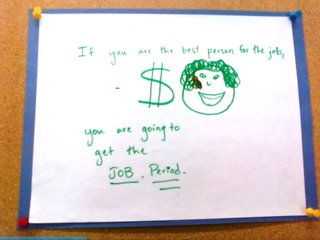 But what do students think represents "the best person for the job"? Who gets to decide? �How many dimensions of the job can be used to decide who is best? The Civil Rights Act is an exception to the concept of at-will employment, which recognizes the right to private contract between employee and employer. �I hope that shows up at some point in this student's education. �
But what do students think represents "the best person for the job"? Who gets to decide? �How many dimensions of the job can be used to decide who is best? The Civil Rights Act is an exception to the concept of at-will employment, which recognizes the right to private contract between employee and employer. �I hope that shows up at some point in this student's education. � 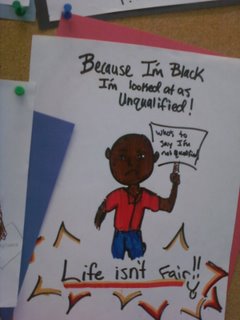 Who's to say you're not qualified? How about the person who will pay you to work for her? Does she have a say in this?
Who's to say you're not qualified? How about the person who will pay you to work for her? Does she have a say in this?We all get our income by persuading someone else to give it to us. �(Except for government; it gets its income at the end of a gun.) �We can persuade employers to hire people of color�qua�people of color because it increases the firm's sales or production of goods and services someone else sells. �When it does, the person of color would be favored regardless of whether there is a law in place. �If it does not increase sales of production, the law's compulsion of to hire the person of color acts as a tax on the firm's profits, and causes the employee who would have been hired instead to take the next-best job. �If you want to argue that's an OK price to pay, do so. �But you should not pretend that cost does not exist.
Labels: higher education, SCSU
Tuesday, October 14, 2008
Daily effects of indoctrination IV, Part 4
(Part 1, Part 2, Part 3 for background)
There were two interesting sub-themes in the board that was presented to us in response to an anonymous poster who had the temerity to challenge a department's leftist orthodoxy. One was to focus on "goals-oriented affirmative action". It was an odd focus, and the only explanation that works for me is that this was a discussion point in a classroom. Of course, that's speculative.
But I'm also lead to believe this by two other posters that had this odd theme as well. Take for example, this one:
Consider that list: race, color [sic], national origin, sex, disabilities, veterans. Really? Are preferences for veterans -- that existed after almost any war -- a form of affirmative action? Apparently so recently, but using the affirmative action reporting mechanism to administer veterans' benefits is not the same thing as calling it affirmative action. We have long had in America a notion that part of the payment to veterans for their service, particularly in wartime, comes after their demobilization. Federal job preferences are a longstanding benefit. It appears recent law has directed private job benefits as well.
As the following pictures shows, though, it isn't just that for the students in this class or club:
I have wrestled with that poster. What this Marine is entitled to is our thanks, our support, and the full benefits of what they signed up for. A Marine gets a value in return for a value offered to his or her country, by his own actions and choices and preparation. I'd like to ask veterans reading this post: Do you consider the veterans benefits you receive a form of affirmative action? Some in academia say 'yes'.UPDATE: A private correspondent writes:
I think that poster has equal opportunity employers confused with affirmative action employers. Equal opportunity employers promise not to discriminate. Affirmative action employers are the ones who promise to hire qualified minorities, women, etc over white men.The Department of Labor provides information on affirmative action and for veterans. I read that to mean federal jobs or those with its contractors and subcontractors.
Labels: higher education, SCSU
Monday, October 13, 2008
I learned a new word
I saw a note on campus for a film sponsored by a student group I had never heard of before.
AniMent Action on Campus - AAC
Welcome to AAC! We are here to work for equal rights of animals, and support environmental issues. We will be actively involved in the community on campus, in St. Cloud, and in the state of Minnesota.
Come join us for the betterment of our local community, and to raise awareness about AniMent issues!
I thought it was a group of students who drew anime art. �Instead it's a group that combines animal rights activism with environmentalism. They could have left out the "on Campus" part: Where else would you find such a thing?
Labels: higher education, SCSU
Daily effects of indoctrination IV, part 3
In which we find the quality of mercy is often strained.
(Part 1, Part 2 for background and to catch up.)�
In part 2 we had a few slides that showed a great deal about the subject matter of this class, but did not have any real animus towards the person who drew the counter-poster to which this class has reacted. �Alas, not all had that quality.
I've chosen to block out this student's name (I'll leave the illustration, so you know it's a female), but I found it touching after writing:Get educated before you open your mouth and speak! �If you knew what affirmative action is you wouldn't be so stupid to put up a poster like that ... you are the cause of so many problems we have these days ... It's ignorant people like you that cause the races to divide ... GET YOUR FACTS RIGHT!
...that she chooses to leave a parenthetical
(and if you have any questions my name is yyyy yyyyyyy and we can chat...)
Do you always leave notes for people you want to "chat" with that have you underlining the words ignorant and stupid? �How's that working for your love life, Miss? "Biff, you're stupid and ignorant. Here's my cell, call me!" �I have to call that one my favorite.
This one is not quite as much fun. "Ignorant people talk without knowing what they're talking about." I believe that's called a tautology, yes? But the bubble quote is not tautological: "I use bigotry because I can't take responsibility for my actions." The poster is an imitation of the counter-poster, and on the kid's rejection slip it reads "not as qualified as you think."
Remember, this appears to be an organized response, on a board that a department has claimed as theirs. �This seems a good deal of hostility in this poster. �Is this something that academics should encourage? �I think, but do not know, if this is a classroom exercise. �If it was, how was it graded? �The line at the bottom reads "Why would any businessperson in their right mind lose money by hiring an unqualified person regardless of color?" �I don't know what that means exactly, but it sounds like a taunt. �
Today's liberals seem to be taking their marching orders from other quarters. Specifically, from the college and university campuses where administrators, armed with speech codes, have for years been disciplining and subjecting to sensitivity training any students who dare to utter thoughts that liberals find offensive. The campuses that used to pride themselves as zones of free expression are now the least free part of our society.
Labels: higher education, SCSU
Friday, October 10, 2008
Daily effects of indoctrination IV: Part 2
Yesterday's edition introduced us to the new board created by someone in the Community Studies department in the back stairwell of Stewart Hall here at SCSU. �I noted while walking around the building yesterday -- I work in a remote corner of the building, so I see lots of hallways and stairwells -- that that department has new bulletin boards up awaiting material. �As the song goes, I can't hardly wait.
The board in question provides responses to a counter-poster who had responded to a set of illustrations for an essay titled "Daily Effects of White Privilege." �It is written as "this is our response"; there are names on some of the responses that are also in the student directory, so I'm going to assume the students are a member of a class (perhaps a club instead, we should admit as a possibility.) �In either case a faculty member is with them as professor (or advisor.) �Let's look at a few more of these responses.
"simle" ... who has time for proofreading?Here's the point: I put a job description on a website for new PhDs to be new assistant professors on campus. I get a bunch of applications. The first cut of the pool is between those who are qualified for the job and those that are not. I can rank in some way, perhaps, those that are more qualified than others. But at the end of every job application process I have a tradeoff in front of me -- one candidate has a set of skills making her better in one area than the other, the other has a different skill set making him better in the other. How do I weight that? If some non-job characteristic like sex or race is counted as a criterion in the hiring process, then the process of trading off means that characteristic compensates for a lesser skill in something else. You can't say at the same time "we value diversity" and "there are no qualification differences between the diversity-preferred and diversity-unfavored candidates" because the latter means diversity had no value. A line has no width.
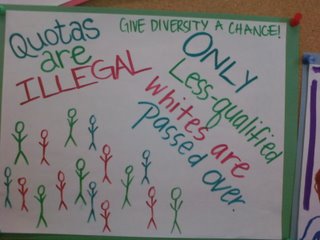
Again, the question -- in what way are they less qualified when we "give diversity a chance"? �Are they less qualified because they can't put a 'Y' or a '1' in the diversity box on the application screening form?� And notice the confusion here -- nothing that the counter-poster wrote said anything about quotas. �Is the professor or advisor doing any teaching here?
Now this one is very interesting. It suggests that the firm makes more profits by hiring on the basis of "goal-oriented affirmative action." (That term could mean numerous things, but in Minnesota it has a particular definition under state law.) If it really improves profits, why would a firm ever need a program? But this would allow for customer discrimination: If it improves my profits as a car dealer to have a male sales staff, I will prefer to hire only males. Now it might improve your profits because the State of Minnesota won't do business with a company of more than 40 employees on a contract over $100,000 unless you have one of thse goal-oriented affirmative action plans. But that's not the profit motive -- that's a use of the confiscatory power of the state to take tax dollars and use them to compel private firms to meet public goals.
More on Monday.
Labels: higher education, SCSU
